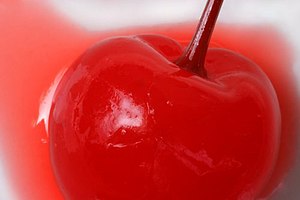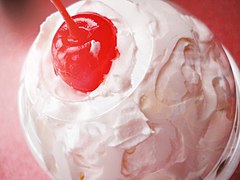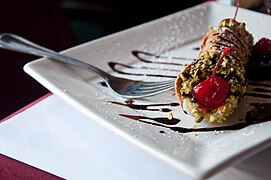Cookbook:Maraschino Cherry
| Maraschino Cherry | |
|---|---|
 |
Cookbook | Recipes | Ingredients | Equipment | Techniques | Cookbook Disambiguation Pages | Ingredients
Maraschino cherries are a sweet confection of flavored cherries in syrup.
History
[edit | edit source]Historically, Maraschino cherries originated around the Adriatic sea, where sour marasca cherries were preserved in an Italian cherry liqueur. They were eventually imported to the United States, where the professor Ernest Wiegand eventually changed the production method in the early 20th century to yield modern-day maraschino cherries.
Characteristics
[edit | edit source]Modern maraschino cherries consist of light-colored cherries that are brined in calcium salts prior to additional sweetening, flavoring, and coloring. The most common color is a bright artificial red, but other colors exist such as green and orange. Additionally, "natural" varieties may be colored with vegetable-based dyes like beet juice. Maraschino cherries are very sweet, with a flavor profile similar to candy.
Some specialty varieties of maraschino cherry may be more similar to the historical version, being preserved in their own juice—these are typically darker and more sour than the modern version.
The high sugar content of maraschino cherries makes them keep very well. Once opened, they should be kept in the fridge. Freezing may negatively affect their texture.
Production
[edit | edit source]The modern method of maraschino cherry production requires several steps. The fresh cherries are first pitted and cleaned, and they are then typically bleached in a solution of sodium metabisulfite, citric acid, and calcium chloride. They are then boiled and bleached in another solution consisting of sodium chlorite and acetic acid. Following the bleaching process, the cherries are soaked in a sugar syrup, brightly dyed, and flavored (e.g. with almond oil).
Uses
[edit | edit source]Maraschino cherries are used in a variety of beverages and desserts. They are common as a garnish for cocktails and non-alcoholic beverages like Shirley Temples. They also frequently top ice cream, pastries, milkshakes, and cakes, and they may be incorporated in various batters. The syrup they are packaged in can be used as a flavoring and sweetener.
Gallery
[edit | edit source]-
Pitted, loose maraschino cherries
-
Milkshake topped with whipped cream and a maraschino cherry
-
A cannolo garnished with a maraschino cherry
-
Maraschino cherry used as a filling for a chocolate confection
-
Cupcake topped with a maraschino cherry
-
Pineapple upside-down cake, which is topped with pineapple and maraschino cherries.
External links
[edit | edit source]- https://spoonuniversity.com/lifestyle/what-are-maraschino-cherries
- https://home.binwise.com/blog/what-are-maraschino-cherries
- https://www.thespruceeats.com/the-truth-about-maraschino-cherries-759977
- https://www.thespruceeats.com/best-cocktail-cherries-5085158
- https://bakerpedia.com/ingredients/maraschino-cherries/
- https://www.epicurious.com/expert-advice/in-praise-of-luxardo-cherries-article
- https://www.nytimes.com/2014/09/21/magazine/who-made-that-maraschino-cherry.html
- https://www.google.com/books/edition/The_International_Confectioner/IwRQAAAAYAAJ?hl=en&gbpv=1&pg=RA2-PA43&printsec=frontcover





